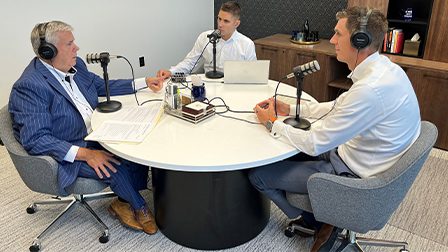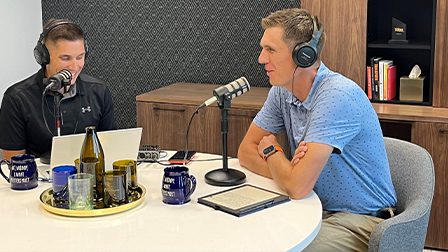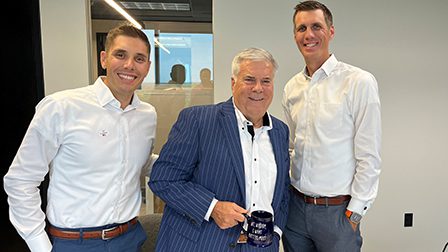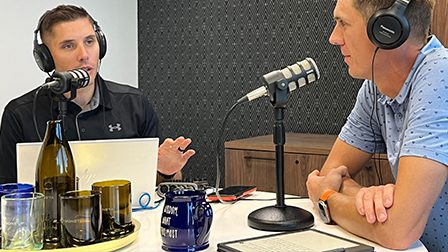Episode Transcript
Show Notes
Kyle: And welcome to another edition of Wit, Wisdom, and What Matters Most podcast with Moneta’s Gast, Freeman Troyer Racen team. My name is Kyle Luetters, joined alongside Danton Troyer. And Danton, very special guest on today’s show as we continue to talk about retirement and the conversations around this particular area and topic.
Well, we have a wonderful guest; someone that you’ve known for a long time, his name is Steve, he works at Charles River and quite a unique story. I’ll bring you in to chat about him a little bit.
Danton: I have known Steve for several years now and really got to know him both as a client and I’ve gone on a couple golf trips with him. So, you know, it’s quite a unique relationship as far as working with a client goes, but I’m definitely excited for this interview and to hear the stories that Steve will share with us.
Kyle: And with no further ado, here’s our conversation with Steve.
And jumping in here to our conversation, we have Steve with us here. Steve, welcome to the Wit, Wisdom, and What Matters Most podcast. It’s good to see you, good to talk to you today.
Steve: Great, thanks for having me; appreciate it.
Kyle: So, I know that I’m going to bring Danton in here on this one because you and Danton have had quite a relationship. I’ll let Danton kind of take over from here because Danton and Steve, you’ve known each other here for quite a while.
Danton: Yes, Steve and I have known each other for several years now. It’s been a fun client relationship and even getting to go play some golf outside of the office, as well. So, we’ve definitely had some fun times over the last several years as well. And so hopefully today we just talk about as you approach retirement and what that feels like and looks like for you. And I’m sure we’ll get some good stories out there as well.
Steve: Oh, good, yeah. Perfect.
Kyle: Right, so Steve, you’re at your Charles River Labs.
Steve: Yes.
Kyle: How did you end up there because the fascinating stories are how do people end up in the situations and the places that they end up? So, give us the lay of the land, give us the journey, how did you get to where you are today?
Steve: And it is kind of an interesting story. So, I’ve been working, I have a PhD in toxicology. I’ve been in the toxicology pharmaceutical business now for 25 plus years. I’ve worked at a number of major pharmaceutical companies throughout my tenure. And when I was at the last one, I was recruited to Charles River Labs. And they made me an offer to come and help set up a new facility and I took it.
What’s funny about it is years later my boss at that pharmaceutical, that last pharmaceutical company, is the one who gave the recruiters my name. I found that he really wanted me to come. And through some offers they made that I basically couldn’t refuse,
I took the job. Then I found out years later, he told me that, hey, I got you recruited here.
Kyle: Oh, that’s quite the story. So, you mentioned a PhD in toxicology -describe kind of how you get that degree, what goes into your day-to-day world and lifestyle because we talk to folks that come from all sorts of different walks of life. This is not necessarily your run of the mill accountant or engineer or dog catcher. I mean, this is, this is a bit different. So, what does your day actually look like?
Steve: So, my day or how I got here? So let’s start with how I got here. Like everybody else, I went to college and was one of those people who did very well in high school, graduated third my class in high school, knew I wanted to do more. At first, I wanted to do medical school, like many, many people do, but I spent time with my own physician. He allowed me to go in and see patients and I realized that medical school wasn’t for me. So, I started doing research as an undergraduate and that clicked and I knew that I wanted to go on. And so I ended up getting my PhD actually in molecular and cell biology from the University of Connecticut. And back then, everyone did what they called the postdoc, which is kind of like a residency or internship for PhDs, which I did at a very well-known lab at the University of Wisconsin.
And then was recruited to my, unless my wife says it, my first job at what used to be called Park Davis Research in Ann Arbor, Michigan, where I was brought in to do a variety of toxicology jobs. I was then recruited to another major pharmaceutical, and then ended up at Charles River, as I mentioned.
My day today is, now my title is chief scientific officer for safety assessment. I spend a lot of time working with our clients, many of my major pharmaceutical clients. I work on strategy, direction for the organization, general problem solving, and a lot of harmonization and alignment of our sites throughout our organization. I answer a lot of questions on a day-to-day basis.
Danton: So, this is right up your alley then. Steve, you were talking about kind of high school on, but what was the thing you wanted to be when you grow up? How far off is it, or was it in the ballpark?
Steve: Well jokingly, I don’t know if I should tell this story in my role, but when I was in graduate school, I always thought I wanted to go into an industry and do research and industries, discover new drugs and things of that nature. And we had a grant, we were a joint grant, basically my PhD is in biochemistry, molecular and cell biology, with a heavy emphasis on protein chemistry. And we shared a grant with a toxicology group, and I figured I would sit in on some tox courses just to see what that discipline is about. And I swore to myself, after just sitting in on the classes, that I would never be a toxicologist.
And it’s kind of funny now that I am the head of or the lead toxicologist for the largest non-clinical CRO in the world. It’s kind of funny that I ended up in this role. So, you never know where life’s going to take you.
Danton: Yeah, I definitely agree.
Kyle: You make good mention of how you’ve gotten to the point that you’re at, it’s this fascinating journey. This is one of the reasons why I love having these conversations is the pathways are always really interesting.
But we’ve talked about the past a whole lot, and let’s talk about the future a little bit, because part of what we’re doing on this podcast, at least in this series, is talking about retirement. It’s not just necessarily folks that have been in retirement for a while, or they’ve just gotten into retirement.
Walk us through maybe a little bit, how much longer you potentially see yourself working, and would anything change that? Do you have an eye toward that? I mean, at a certain point, everybody’s going to kind of be done. But describe where you’re at these days.
Steve: So last year, I turned 60, so I’ve reached that threshold. So, as you know, as you’re getting to your 60s, and you’re now in the age group and your peers and your friends and family are probably of similar age. They all either have or are looking at retirement as well. I’m in that same ballpark.
When I exactly retire, Danton and I have kind of set a date on paper, but it’s not written in stone. I really still like what I’m doing. I like contributing to the organization. But it is on the horizon, I’m not going to say how far. I’ll say somewhere between four and seven years, right now.
So what could change that? I think everybody who works, whether they just started or are in my shoes or a person a year from retirement wakes up every day and says, is today the day I retire?
Danton: Yeah.
Steve: You know, you open your first email and you’re like, oh, gee, I think I should retire today.
Kyle: Today’s the day!
Steve: But then there are successes and the things that work really well, and so you keep going. So, you know, that’s for me, but I do think about it because I am getting closer. I have, as I said, peers and friends and family who are either looking at retirement in a very short amount of time. But as I said, I really like what I’m doing right now.
What could change that? Of course, winning the lottery. I always think about my first phone call after winning would be to Danton. Like, okay, how do we take this money and what do we do?
You know, the industry is always changing. That could have an impact. Either one way I stay longer, leave earlier, whatever. But right now, it’s again, I really don’t know what could change that. Those are the probably the biggest things is what’s going on in the industry or if I don’t like what I’m doing anymore. But I don’t think I’m one of those people that can just stop.
Danton: You mentioned a lot of people around you are contemplating retirement.
Have you seen either family, friends, or co-workers who went into retirement and did it well, you thought? Or the other side of it, have you seen anybody who you were like, I’m not doing it that way; I think that was a big mistake?
Steve: I’ve seen all of it. I’ve seen people who have retired and have walked away and never looked back. A friend of mine who I’ve known since my very early days at Parke-Davis retired. Said if he ever did go back, he would maybe join a biotech, but never in large pharma again. Within two weeks, he was back in large pharma.
So, you know, I see people who, a friend of mine recently retired in the last year or two, retired, but now he’s off consulting. I think it’s just that most of the people I know and interact with are similar, similarly educated as I have, reached the same or similar levels or even higher in organizations, and they’re not people who can probably just walk away automatically. There’s always something; they’re going to do something. They’re not just going to sit and go play golf forever.
Danton: How do you see that relating to you and your retirement then?
Steve: Yeah, I’m thinking, you know, I always have thoughts. I’m going to have to do something, whether it’s…I think about food banks, volunteering at food banks, watering plants at a nursery, you know, anything just to keep me busy, you know.
Will I consult? I don’t know, I think about it once in a while. But then again, I’ve been in our business, while we help companies develop drugs, we are a service provider and, you know, you get kind of tired of that.
I’ve also talked, thought about, could I go work for another company, a small biotech and just say all I want to do is develop the next drug? No management, no decision making in that regard, just be a workhorse to keep my brain going, keep myself going.
Danton: As you’re talking about that, I think the answer is yes, but are you looking forward to retirement?
Steve: Yes and no. Yes, that the day-to-day, every day getting upmand going and doing it is one thing, but so that, yes, that from that part.
But no, from a point of, as with many of my peers, is where we’ve gotten an education, where we’ve gotten our careers, it’s not just a job, it’s not just a career, it’s also a lifestyle and part of who you are. So, you know, tomorrow, you retire and now you’re not the global head of X or the chief scientific officer, you’re just Steve or Jeff or whoever, you’re just not that anymore, and that was a big part of who you were.
Kyle: Mm-hmm, yeah, thank you. You touched on a big thing right there, Steve. So much when we’re working, our identity is tied up in our work. That’s an interesting thing to ponder and consider and you did a great job of kind of exploring that.
To take it back to the family thing a little bit, we talked about family and friends and how does that impact? You’re married, your wife’s name is Sue, how does, what does she think about all of this stuff? For lack of a better term, is she wanting you to retire or is she fine doing her own thing? Or how do you think that’ll impact that or the relationship there when you retire?
Steve: Well, we’re joking I know a lot of people, so one of my previous people in these jobs at our company, I do a lot of traveling. And the first thing that spouses want to do when you retire is travel, and I remember her saying like, really? I traveled so much in my career, next, I really don’t; I want to just stay home for a little bit. So, she’s looking forward, I think, she’s looking forward to it. She’s very supportive of any decision I make, a lot of it has to do with working with Danton and Moneta about when I can, how much will I have and that, so, but she’s looking forward to it, she thinks I deserve to do whatever I want to do.
Danton: Do you think the dynamic will change and how do you see that changing with you? Not only with Sue, but you have kids and just family in general.
Steve: I think it’ll change; like many parents as the US bank of dad, so you got to dinner, do you think they ever reach for the check once? No, they still expect that. So, when you’re retired, you start thinking a little more closely about finance because that new source of income isn’t there. It’s based on your investments and things and depending on how the market is, you may have a lot of money or not so much money. So, I think that’ll change, kids will have to get used to that.
I think being home all the time, I’ll just say that just before COVID hit, my wife, my office that I’m sitting in right now, it basically didn’t have a doorway, it was a big frame before COVID. We built a door and she says that’s the greatest investment in the house she’s ever done is build a door with a lock on the outside.
So, during COVID, when I went from traveling, the last year before COVID, I traveled 300,000 miles air miles, and went from that to zero. There were times where she said, just go stand in the front yard and get out of the house. So, I think it’ll take some getting used to, but, you know, I think it’ll be fine.
Kyle: It really does sound like you got a good grasp on it, and we’re kind of coming up here on time a little bit, but Danton, you’ve obviously got the chance to work with and know Steve for a long time. Any other things that you think about here as we head for home in our time together?
Danton: I think a good last question maybe is if you could give yourself advice when you were 18…? Now you’ve had a successful career and you’re approaching retirement, is there anything you would change and maybe go back and tell your 18-year-old self, don’t do that?
Steve: I think it would be to invest early. I look at, when you see the statistics out there that most people have a small amount of money they have in savings or for what they’ve got for retirement. I know not everyone can do it, but I would look for ways to save because you want to retire, you want to be comfortable. I would tell myself that I would look at things more, the financials of my future a little differently. I think that would be the biggest thing I would do. You know, I think that’s probably it.
Kyle: Solid, sage advice.
Well, Steve, we appreciate it very much. Thank you so much for that time today, appreciate it very much. And that was Steve on Wit, Wisdom, and What Matters Most.
That was our conversation with Steve and Danton, and what a conversation. The guy had a tremendous amount of energy, number one. One thing we didn’t get to is he still plays lacrosse and when we were talking with him offline a little bit, he talked about his knee and a few other things like that. So, he’s still quite an active guy, again, a lot of energy. But what was your big takeaway from this conversation? Because it was kind of fascinating to follow the entire story.
Danton: It’s always good to talk with Steve, and the first time I heard he was still playing lacrosse and at a pretty high level, I was a very impressed. And I’ve definitely seen his war wounds and bruises from the competitions and tournaments he plays in.
But, for me, the single thing that kind of stood out from our conversation was just that difficulty, potentially for especially high-level executives, is your job has really become your identity and that’s who you are. And that goes away in many ways when you retire. And so maybe thinking about it a different way, we always ask what are you going to do in retirement, but maybe it’s like, what do you want to be in retirement? So, that was really the, obviously there was a lot there, but that was the biggest thing that I took out of our conversation.
Kyle: Yeah, I agree with you 100% because so much of what we do, when you think about it…you spend the most amount of your time doing something, it’s a job, a vocation, a career, whatever you want to call it. And when you retire, that kind of stops. And to your point, it becomes so wrapped up in our identity that I’m no longer X or no longer Y, you kind of have to redefine yourself, maybe. And I don’t want to get too flowery with it, but maybe there’s that period where you kind of redefine who you are and how you identify the contribution that you’re making to the world. And sounds like Steve’s got a wonderful perspective and some options that he’s floating around in his mind about what he may do when the time comes.
Danton: Yeah, absolutely. I mean, we see it all the time where folks that are in those high-level positions, they have the retirement date kind of picked in their head and the date usually comes and goes, and that’s probably part of it – pulling the trigger and being certain that you’re actually going to be done. And I think it could be a scary part of retirement.
Kyle: Certainly something to think through. So, Danton, as always, appreciate it, appreciate you.
Wit Wisdom and What Matters Most is a production of Moneta’s Gast Freeman Troyer Racen Team, headquartered here in St. Louis, Missouri. And we appreciate each and every one of you for listening and until next time, enjoy what matters most!




© 2025 Advisory services offered by Moneta Group Investment Advisors, LLC, 100 South Brentwood Blvd., St. Louis, MO 63105 (“MGIA”), an investment adviser registered with the Securities and Exchange Commission (“SEC”). MGIA is a wholly owned subsidiary of Moneta Group, LLC. Registration as an investment adviser does not imply a certain level of skill or training. This is an advertisement. The information contained herein is for informational purposes only, is not intended to be comprehensive or exclusive, and is based on materials deemed reliable, but the accuracy of which has not been verified. Examples contained herein are for illustrative purposes only based on generic assumptions. Given the dynamic nature of the subject matter and the environment in which this communication was written, the information contained herein is subject to change. This is not an offer to sell or buy securities, nor does it represent any specific recommendation. You should consult with an appropriately credentialed professional before making any financial, investment, tax, or legal decision. Past performance is not indicative of future returns. You cannot invest directly in an index. All investments are subject to a risk of loss. Diversification and strategic asset allocation do not assure profit or protect against loss in declining markets. These materials do not take into consideration your personal circumstances, financial or otherwise. Trademarks and copyrights of materials linked herein are the property of their respective owners.



